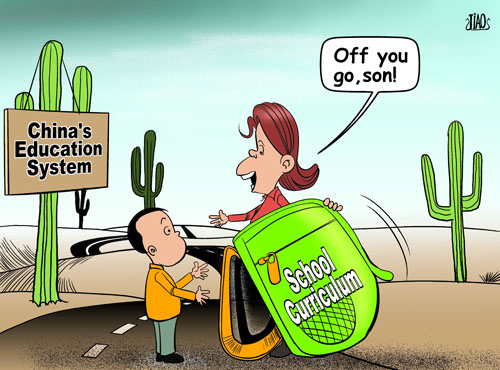Unconventional higher education make its way?
- By Xiong Bingqi
 0 Comment(s)
0 Comment(s) Print
Print E-mail China.org.cn, March 14, 2012
E-mail China.org.cn, March 14, 2012
|
|
|
[By Jiao Haiyang/China.org.cn] |
A controversial new university in Shenzhen of Guangdong Province is expected to officially launch this year, according to the school head. He said that he has found a qualified candidate as his successor.
Zhu Qingshi, the president of the South University of Science and Technology of China (SUSTC), as well as a CPPCC member, made an announcement after the opening ceremony of the fifth session of the 11th National People's Congress (NPC) last Monday.
The university has been on a bumpy road since its very beginning. As the founder, Zhu plans to leave his post when his term of office is due. Some people are worrying that even if the university can officially be approved this year, its future is still in the mist, especially after Zhu's leave.
As a newly-established university, it needs necessary pre-conditions for education. It made pilot trials of a different education system; however it came across various problems during its application process, which aroused public attention.
Firstly, by far, the university hasn't worked out its regulations yet. When Zhu took his post, he said that one of his urgent tasks was formulating the university regulations. According to a local government official, the regulations had to be submitted to the local People's Congress for approval. However, the process didn't go well. Last year, the local government only approved a temporary administrative regulation of the university, but the details of management measures haven't been published yet.
I particularly hope to see the complete SUSTC regulations approved by the local People's Congress when the university is officially launched. This will be the first university regulations formulated through legislative procedure in China, as well as a model for public universities to clarify the respective responsibilities of the government and university.
Secondly, the university hasn't decided the details of student enrollment. It aims to recruit students and grant degrees independently. However, when it gets the enrollment certificate from the education authorities, can it continue this reform?.
According to the current education administration system and degree granting regulations, SUSTC has to be included in the national system of degree qualifications. It would be difficult for the university to grant its own degrees independently.
Whether it is allowed to recruit students independently depends on the reform of the country's university entrance exam. "We will surely continue to recruit students independently after the university's official launch. It is to be decided whether the students need to take part in the national university entrance exam," Zhu said. If the students still have to attend the national university entrance exam, is it called independent enrollment? SUSTC may copy the way of Hong Kong universities recruiting mainland students, which combines the student's national university entrance exam scores with his/her performance in secondary school, plus interview results. This is also a form of independent enrollment, and moreover it is a sustainable model, which may push forward the reform of the present university enrollment system that only focuses on university entrance exam scores.
The future of SUSTC depends on China's education reform and the relationship between the Shenzhen government and the university. According to the country's educational reform outline, the university still has the hope for its independent enrollment and degree granting because the reform outline says that universities will have more freedom in enrollment and degree granting.
The top priority of SUSTC is to formulate university regulations which can be followed by other universities as well; this is more important than the construction of school buildings, the recruitment of teachers and Mr. Zhu's successor. When this is done, all the rights and responsibilities concerning the government, university, teachers and students, the selection of university council and president, and the university's administrative, educational and academic organs will be clearly defined. So the university culture can be continued and guaranteed by the system, regardless the change of its president.
This post was first published in Chinese and translated by Xu Lin.
Opinion articles reflect the views of their authors, not necessarily those of China.org.cn.







Go to Forum >>0 Comment(s)